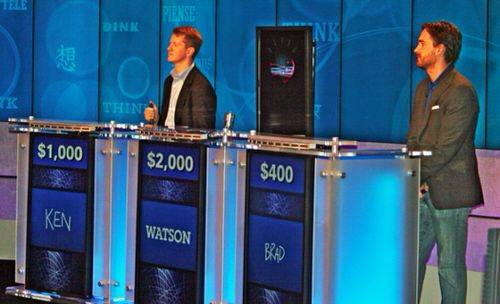IBM’s Watson supercomputer will take on Jeopardy champions Ken Jennings and Brad Rutter in a man-versus-machine Jeopardy competition that will air in February. The grand prize for the competition will be $1 million, with second place earning $300,000 and third place $200,000.

And at a practice round today, Watson was faster on the buzzer – and correct with its responses – than its human competitors.
The Jeopardy match-up is meant to showcase the development of IBM’s artificial intelligence technology. IBM describes Watson as “an application of advanced Natural Language Processing, Information Retrieval, Knowledge Representation and Reasoning, and Machine Learning technologies to the field of open-domain question answering.” Named after IBM founder Thomas Watson, the supercomputer is the culmination of over four years of research and development.
Watson is the successor to IBM’s Deep Blue, the computer that famously beat World Chess Champion Garry Kasparov in 1987. But winning at Jeopardy is significantly more complicated than winning at chess (no offense to chess champions), as it involves a great deal more than simply understanding the next-best-move on a chess board. Watson needs to be able to understand the questions asked (or, rather, answers given), something aided by the 200 million some-odd pages of content that have been entered into its system. And it also has to be able to weigh which categories to choose and how much to wager in the final round.
Watson is powered by 10 racks of IBM Power 750 servers running Linux with 2,880 processor cores running at 80 teraflops and 15 terabytes of RAM. By comparison, Deep Blue ran at around 1 teraflop. It takes Watson less than 3 seconds to scan those millions of pages of content, and respond with its noticeably Hal-like voice.

Photo credits: Sam Gustin, Wired

















